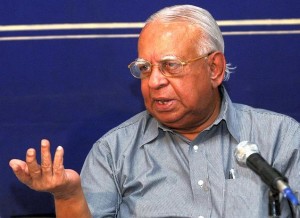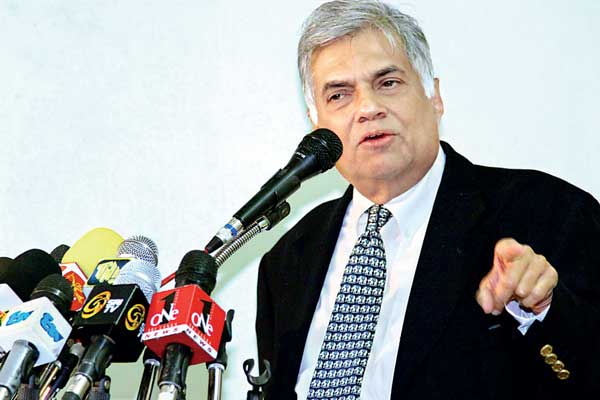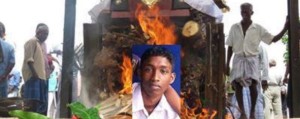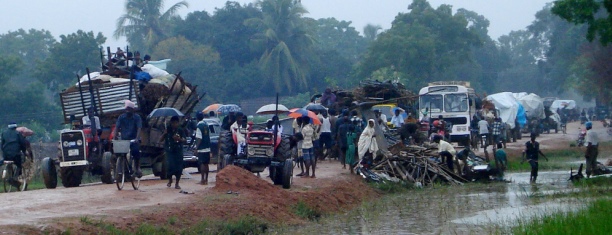“The devastation that has occurred in the North and the East, Mr. Speaker, consequent to the war over a long period of time, is extensive – unbelievably extensive. Tens of thousands of families have been rendered destitute. They have lost all their possessions, their houses, their livelihood; all means of such livelihood, all their equipment – agricultural equipment, fishing equipment, livestock equipment. Some of them are unable to return to their residential and occupational lands. Very much needs to be done. The Hon. Minister of Finance has allocated a sum or Rs. 14,000 million for this purpose ” says TNA leader and the leader of the opposition R. Samapanthan.
He was speaking at the budget debate on 28th November. Full speech fellows:
Thank you, Mr. Speaker. An alliance Government with the SLFP Leader, His Excellency Maithripala Sirisena as President and the UNP Leader, the Hon. Ranil Wickremesinghe as Prime Minister, has presented the Budget for 2016. The presentation has been done by the Hon. Finance Minister, the Hon. Ravi Karunanayake.
This is the first time in the country’s history that the SLFP and the UNP are together in Government, particularly with a Member of the SLFP as President and a Member of the UNP as Prime Minister by mutual consent. The Leaders of the two Parties and the Parties have decided to work together in the interests of the country. This is a significant attribute of this Government.
In order to appreciate the importance of what has been achieved, it would be relevant to examine briefly how it happened. It did not happen by accident.
This country was, for some time, ruled as if it was a family fiefdom – it was some member of the family who decided on everything and anything. Totalitarianism was brazenly practised. The Constitution was amended so as to be in power forever or for long. This inevitably irked even the SLFP Members in Government, but they had to bide their time until the Presidential Election was announced. On a fateful day in November, 2014, the incumbent President took the crucial decision to call for an election and made the announcement. This was followed by the Hon. Maithripala Sirisena, the Secretary of the SLFP and a Senior Minister in the incumbent Government, announcing his candidature. The UNP announced its support to the Hon. Maithripala Sirisena and he was anointed as the Joint Opposition Candidate. The late Mahanayake, Ven. Sobhitha Thero, played a very crucial and critical role in this event. The rest, Sir, is history.

One should however realize the importance of what has happened. It was these unusual circumstances that brought the SLFP and the UNP together. The Hon. Ranil Wickremesinghe was appointed Prime Minister after the Presidential Election and after the Parliamentary Election, has been reappointed Prime Minister as the UNP won more seats in Parliament than any other Party. Today, the UNP and the SLFP are firmly in Government with the Cabinet of Ministers comprising of both UNPers and SLFPers.
This is a totally new situation, which has never existed ever before and gives the UNP and the SLFP, as constituent Parties and alliance partners in Government, an opportunity to address all issues, whether economic, political or social, on the basis of a consensus that would be in the best interests of the country as a whole and all its peoples. This would be the most salient feature of this Government, if the constituent partners do not lose sight of what should be their main objective, which would be to bring this country out of the morass in which it is mired economically, politically and socially, both at the domestic and international levels. Democracy, the dignity and legislative authority of Parliament, the independence and judicial authority of the Judiciary, the integrity and efficacy of other institutions of governance, the rule of law and the freedom of the press and the media were all becoming a charade. There was a deeply entrenched an all pervasive culture of impunity.
My Party and I are not a part of this Government, though we did make our contribution to the change in Government. We have been longer in the Opposition than anyone else and even today, we sit in the Opposition. But, that should not debar us from recognizing the change and stating what our expectations are insofar as the present Government is concerned.
The Budget presented is to address the dire straits in which the country’s economy is and also to address areas in which inadequate attention had been paid in the past.
Sir, there are certain fundamental issues that I would like to raise. The first would be the waste, the extravagance and the lack of austerity that is widely prevalent in all activities of Government. This is a matter which, I think, needs in-depth analysis and study. But, I have not the slightest doubt that the cost of such waste, extravagance and lack of austerity to the country is colossal.
The other issue that needs to be very seriously addressed is the issue of corruption. Corruption has had a long and a free run in this country, so much so that it could be said that corruption has become institutionalized and is an integral part of the system of governance. Is it not necessary, Sir, to take effective steps to avoid waste and extravagance and also to eradicate corruption?
I want to refer to a particular paragraph in the Budget Speech of the Hon. Minister of Finance. I refer to Paragraph 402 relating to SriLankan Airlines. This is what it said, I quote:
“SriLankan Airlines – Hon. Speaker, the SriLankan Airlines has been badly managed since the management was taken back from Emirates. Their total debt stands at Rs.158 billion, of which 72 per cent relates to the last 3 years of the previous regime. This could be mainly due to corruption, cronyism and poor management. To point blankly state so is an injustice to the tax payers of this country and also an understatement. This accumulated loss could have financed 45,000 buses, 25 fully fledged universities, 40 fully equipped modern hospitals and 48,000 houses……”
This is the estimate of the degree of the loss that the country has suffered as a result of what happened at the SriLankan Airlines. Is it not necessary, Mr. Speaker, to take effective steps to avoid waste and extravagance and also to eradicate corruption? What I quoted above with regard to SriLankan Airlines is just one instance. The gravity of the country’s predicament can be better appreciated, not merely from an awareness of the financial loss suffered – Rs.158 billion which is a very large sum of money – but the equivalent practical loss caused to the people of this country in regard to matters vital to them, such as transport, higher education, health and housing.

The question that I wish to pose is, how do you deal with this situation and at least ensure that such things would not happen in the future? Given the massive development plans that the Hon. Prime Minister outlined in his Statement on Economic Policy some days before the Budget and what has been outlined in the Budget, what action would you take to prevent repetition? If waste, extravagance and corruption are eradicated, I would think that at least one-third of this country’s economic woes would come to an end with more money being available for development for the benefit of the people. We are a country deeply in debt.
A substantial part of our income is used for debt service. Our debt service ratio is high – both domestic and foreign debt. If we tolerate waste, extravagance and corruption, how are we going to reduce and eventually get rid of our debt? I would submit that stringent action needs to be taken to achieve this. I do not think that it is within the power of your 90-member Cabinet to achieve this. I think, a few persons of the highest integrity, with specialized knowledge and experience should be specially empowered to examine and analyze in detail all aspects of Government expenditure and come up with plans and proposals to reduce and remove waste and extravagance. Their recommendations should be implemented. It appears to me that whatever arrangements you have now are inadequate.
Corruption needs to be eliminated with a firm hand. Given the fact that corruption is deeply entrenched in governance in this country, we perhaps need special laws to deal with this menace – special offences even beyond what is now available, new provisions of law relating to detection, investigation, trial and sentence pertaining to corruption which will convey the message to the whole country that the Government will not tolerate corruption in any form, and that those who are corrupt will be very sternly dealt with. There is, in my view, a need for a new initiative and a new message from the Government. I ask you in the name of the people of this country, can you permit what happened at SriLankan Airlines to be repeated?
Sir, I wish to say a few words about our exports and imports. Our exports have halved, our imports have doubled; our imports are almost double that of our exports. It is imperative that we need to enhance our exports. Our economy must achieve this to survive. The problems that we had with GSP Plus adversely affected our exports, both to Western countries and other parts of the world. We have not recovered yet fully from that downfall. This was caused as a result of our poor record in other areas. Countries give you special concessions, but expect you to keep your international commitments. There is no room for pride or arrogance in these matters. These issues must not be used for domestic political purposes, to be seen as patriotic champions of national sovereignty. That would be a deception of the people at their own cost.
There was a time, Sir, when “Ceylon Tea” was looked upon as the best in the world. We seemed to have lost our market in many parts of the world, both European and Arab. There is a decline in production. This has had an adverse impact on tea smallholders. Given our past reputation there is no reason why we should not regain our position as the producer of the best tea in the world. Corrective action needs to be taken both locally in respect of the industry. Incompetence and mismanagement could well be the cause. You seem to be taking some corrective actions also in regard to our markets abroad. I would think that Sri Lankan Missions abroad should play an effective role in regard to the finding of new markets, also to guiding Sri Lankan producers in regard to the markets that are available. It should be a primary duty of our Missions abroad to enhance our markets. I think progress is achievable if serious efforts are made. We should have in our Missions personnel with the competence to handle these tasks.
We should not merely think of markets in the affluent Western countries. We should also think of markets in nearby countries. India has an affluent middle-class of upwards 300 million people, perhaps, close on 400 million people. The Southern States of India can be a pretty big market for Sri Lanka. There are, for instance, items such as lentils and pulses which they need for over a billion people. It seems that the local production in India is inadequate to meet the country’s needs – to meet India’s needs – and are met with imports. Our farmers should be able to grow these pulses and lentils and an export market would be readily available to them in India. It would be much easier to deal with a market closer by. Some of our furniture manufacturers, Damro for instance, is engaged in selling furniture in India. If India can be a market for our goods, we should exploit that market.
The Prime Minister, in some of his speeches, has indicated a thinking to make Sri Lanka a manufacturing hub for the export of goods to primarily India. The manufacturers would be foreign investors with the capital, the technology and know-how to manufacture specific goods for export to India and to any other country. The large market available in India should attract these foreign investors. Such foreign investment would enable our youth to receive technical training, knowledge and employment. Such activity could enhance our exports. Our mission in India could play a vital role in identifying the goods and the markets for such goods. We have the closest interaction with India. More people from Sri Lanka visit India than they visit the rest of the world. Our historical and cultural links are indeed very close. We should not be apprehensive about exploiting the enormous Indian market.
If we are able to produce quality goods in Sri Lanka fit for export, we should also be able to reduce our imports. Wherever possible, expenditure on imports should be avoided. We are an island but we still import US Dollars 150 million worth of fish and fish related products annually. Fishing was curtailed particularly in the North and the East during the war. I do think that expenditure on such imports should be avoided.
The devastation that has occurred in the North and the East, Mr. Speaker, consequent to the war over a long period of time, is extensive – unbelievably extensive. Tens of thousands of families have been rendered destitute. They have lost all their possessions, their houses, their livelihood; all means of such livelihood, all their equipment – agricultural equipment, fishing equipment, livestock equipment. Some of them are unable to return to their residential and occupational lands. Very much needs to be done.
The Hon. Minister of Finance has allocated a sum or Rs. 14,000 million for this purpose. I think it is totally inadequate. He has also announced a plan to convene a Donor Conference in 2016 to enhance the rehabilitation of the North and the East. The Rajapaksa Government was not interested in bringing about a meaningful change in the lives of these people. They had their own agenda which they persistently pursued. The people expect this Government, which they helped to bring into power, to treat them differently.
The attitude and the thinking of the present Government, I am willing to concede, is different to that of the former Government. Certain actions have been taken which are positive in content. Not much change, however, has occurred in the lives of the people. In the case of some, no change whatever has occurred. They continue to suffer undergoing various hardships.
They suffered immensely during the war. It is more than six years since the war came to end. They are a courageous and resilient people and will not succumb. They have democratically, clearly chosen the path of moderation; they want to live as equal citizens with dignity and self-respect and in security within the framework of a united, undivided Sri Lanka. They have rejected extremist elements several times at several elections in recent times. They cannot continue to suffer; their suffering should not be prolonged. The Government’s planning in regard to the future of these people is clearly inadequate. It is true that the Government is in its first year of governance, but these people have suffered for very many years, in fact for many decades. There is a compulsory need for urgent action.
These are industrious people who can make a significant contribution to the development of this country. In fact, they can make a significant contribution to export-oriented development. There should be a comprehensive plan to retrieve these people from their present plight in several fields, in several areas – resettlement, rehabilitation, housing, livelihood and everything else. Our youth are acutely in need of employment. Very substantial numbers – a large percentage of them – are unemployed. That needs to be addressed. The Government should appreciate that the people in the North-East are much worse off than people in other parts of the country. Special attention needs to be focused on the North-East. This needs to be done as a matter of urgency, as a matter of priority. No longer, I submit, Mr. Speaker, can there be a delay. We ask for special action from the Government; special plans from the Government; special steps from the Government to be able to deal with this situation on the basis of urgency and on the basis of priority.
Before I conclude my speech, Sir, I must refer to a tragic incident that happened in Jaffna, yesterday. A young man, “Senthuran” by name, has committed suicide by jumping in front of a moving train. He has left behind a note in some book of his. That student’s action demonstrates the extent of the frustration that the people in the North-East are undergoing. That student has chosen a very rigorous step. He has inflicted upon himself some punishment; punished himself to be able to demonstrate to the country the frustration that his fellow beings are undergoing and experiencing in the North-Eastern part of this country. It is not an incident which can be taken lightly. The Government of the country and we should clearly comprehend the message that is contained in this action of this young man. He has committed suicide; punished himself; left a note in his book which has stated certain things indicative of the sense of frustration, the desperation which got control of him and which also has an impact on the people in the North and the East.
So, you should realize that we should not allow these things to develop. We do not want instability.

I want to convey to that family – that young man’s parents, brothers, sisters, relatives, friends and the people of the North-East – our deepest condolences and sympathies over this tragic loss. And, what is most important is that we should understand; we should comprehend the message that this drastic act of this young man sends; what he demonstrates by his action and we should take collective action without delay.
I thank you, Mr. Speaker.
(Speech made by The Hon. Rajavarothiam Sampanthan – Leader of the Opposition)
